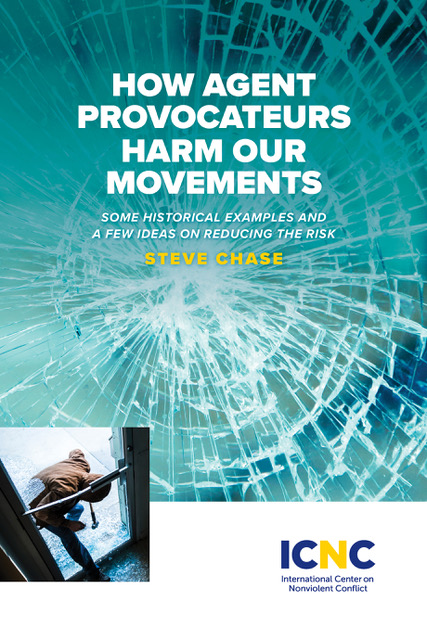With Dr. Steve Chase
January 18, 2022
Webinar Content
Introduction of Speaker: 0:00 – 4:42
Presentation: 4:43 – 55:38
Questions & Answers: 55:39 – 1:19:04
Webinar Details

Opponents of civil resistance movements use a variety of repressive strategies.
One of their longstanding practices is the use of agent provocateurs—people who infiltrate movements by pretending to be activists. These provocateurs then work to create disunity and scandals, disrupt effective strategic thinking, lower participation, and promote or engage in vandalism and violence that can be blamed on the movement. As Erica Chenoweth notes in her book Civil Resistance: What Everyone Should Know, “Their ultimate aim… is to banish public sympathy and support for the movement while giving the government justification for heavy-handed tactics such as beatings, mass arrests, or lethal-coercion.”
In this webinar, Steve Chase, the author of ICNC Press’s new publication How Agent Provocateurs Harm Our Movements, shares historical examples of agents provocateurs; challenges sincere but unstrategic activists who mimic damaging agent provocateur-like behavior; and explores how movements can minimize the harm of such behavior and increase their chances of success. As he writes, “My hope is that this examination will encourage civil resistance organizers to think more deeply about what can be done to minimize the negative impact of agent provocateurs and agent provocateur-like behavior on movements for peace, justice, human rights, and sustainability.”
About the Presenter:
 Steve Chase is a long-time activist, educator, and writer. He has been an editor at South End Press, the founding director of Antioch University’s master’s level activist training program in Advocacy for Social Justice and Sustainability, and the Manager of Academic Initiatives for the International Center on Nonviolent Conflict. He is currently the Assistant Director of Solidarity 2020 and Beyond, a solidarity network and community of practice for grassroots movement organizers in the Global South using advocacy, peacebuilding, and nonviolent resistance to win sustainability, rights, freedom, and justice.
Steve Chase is a long-time activist, educator, and writer. He has been an editor at South End Press, the founding director of Antioch University’s master’s level activist training program in Advocacy for Social Justice and Sustainability, and the Manager of Academic Initiatives for the International Center on Nonviolent Conflict. He is currently the Assistant Director of Solidarity 2020 and Beyond, a solidarity network and community of practice for grassroots movement organizers in the Global South using advocacy, peacebuilding, and nonviolent resistance to win sustainability, rights, freedom, and justice.
Questions and Answers
In the webinar session, there were questions that were asked for which we did not have time to address. Steve Chase has provided written responses to these questions below:
Do you have examples of agent provocateurs targeting feminist movements?
The FBI’s COINTELPRO program certainly targeted various feminist organizations, but I am not sure how much of the repressive activity against these organizations involved agent provocateurs. It seems likely, but I haven’t seen any research on this. This is a great area to look into, both in the US and elsewhere. That would be a great contribution.
Has the bar for “demonizing” a movement moved over time? It seems like nonviolent civil disobedience is sometimes treated as comparable to violence, at least in the US media.
There is a constant struggle over how various forms of civil resistance are portrayed by power elites in mass media and under law. It is in an oppressive power elite’s strategic interest to demonize its active citizenry. For example, in the US, federal law defines nonviolent boycotts against companies engaged in animal cruelty as terrorism. Similarly, several US states have adopted laws that equate boycotts targeting Israeli violations of Palestinian human rights as tantamount to antisemitism and terrorism. It is not accurate or fair, but this effort at demonization is a common challenge in the struggle for justice. For more on this, I would suggest activists and organizers read Brian Martin’s Backfire Manual: Tactics Against Injustice. Brian offers several good ideas on how movements can counteract or mitigate the power of these very common, but false characterizations.
How does a movement handle a situation where the lead organizer is compromised and becomes an agent provocateur?
There are documented cases where authorities have pressured, blackmailed, or tortured formerly sincere activists into acting as informers and agent provocateurs. An organizer I know who worked in El Salvador in the 1980s told me how when labor activists there were released from jail after being tortured by authorities, their union comrades did two key things: 1) these comrades would relieve the tortured leader from organizational decisions for a time, and 2) they would interview the potentially compromised leader in a compassionate, but firm way about what the leader may have revealed to authorities or what promises were made to get released. They reassured the person that there wouldn’t be retaliation and they understood the pressure the tortured leader was under, but said the movement needed to know. This approach often led to a positive resolution of the problem. That said, focusing on counter-productive and unstrategic behavior, regardless of motivation, is probably the best way for activists and organizers to inoculate themselves against compromised leadership in most cases. If there is well-documented evidence of a leader being an agent provocateur, this can and should be shared with the membership. Such charges without strong evidence, though, can harm a movement. When unsure, focus on the problematic behavior and decisions without charging someone with being an agent provocateur. It is important to remember that a common tactic of agent provocateurs is to make unsubstantiated charges against innocent activists and calling them informants or agent provocateurs in order to create conflicts, fear, and distrust in movement organizations.
What would you say to activists who quote Malcolm X to justify violent tactics that might backfire against a movement and increase the likelihood of failure?
First, I think it is important to recognize that Malcolm X was a gifted human rights leader with much wisdom to offer activists and organizers today. At the same time, I think it is important to look critically at his strategic suggestions about movement violence. Take, for example, Malcolm X’s widely quoted 1964 “Ballots or Bullets” speech. In that influential talk, Malcolm X rightly critiqued the racist, “so-called democracy” of the United States, which had long denied voting rights to millions of black people and attacked human rights activists with police guns, dogs, clubs, tear gas, rigged courts, and prisons—as well as defended an exploitive world order through massive militarism and violence around the world. Under these circumstances, Malcolm X wisely rejected relying only on “ballots” for creating a just, multi-racial, and democratic society that did more than give lip service to the UN’s Universal Declaration of Human Rights. He rightly sensed the need for more powerful popular resistance.
In his talk, however, he argued that the best way forward was increasing the use of Molotov cocktails, hand grenades, bullets, and urban guerrilla warfare in the Black Freedom Movement. There is no indication, though, that Malcom X ever seriously studied civil resistance history, its underlying theory of power, or its strategy and tactics—let alone the relative effectiveness of civil resistance compared to armed struggle. Toward the end of his remarkable life, he was very strong on analysis and vision, but less strong on strategy because of this.
Also, it is important to note that he wasn’t speaking all that strategically when he argued for more violence in the US Black Freedom Movement. He was mostly talking about his emotional response to witnessing so much anti-black oppression and violence. As Malcolm said in his talk, “When you drop that violence on me, then you’ve made me insane and I am not responsible for what I do.” That is emotionally understandable, and we can all deeply empathize with his horror at the racist violence against oppressed people he saw everywhere around him. At the same time, today’s activists and organizers have good reason to doubt if such emotions are a good basis for assessing what might be the most effective way for movements to achieve their goals. This is particularly true when we now know, as I and several others have documented, that agent provocateurs routinely instigate or encourage violent tactics within social movements by exploiting such emotions in order to make sincere movement participants act in ways that the provocateurs believe will make social movements smaller, weaker, and easier to defeat. We should not take that bait.
Recommended Reading
How Agent Provocateurs Harm Our Movements by Steve Chase
“How to Counter the Growing Threat of Agent Provocateurs” by George Lakey
“Agent Provocateurs as a Type of Faux Activist” by Gary T. Marx
“Nigeria: How Agents Provocateurs Triggered Government Repression During the #EndSARS Movement” by Amos Oluwatoye
“What Can We Learn from Agent Provocateurs?” by Steve Chase
“Licensed to Kill…Discourse? Agents Provocateurs and a Purposive Right to Freedom of Expression” by Katie Pentney